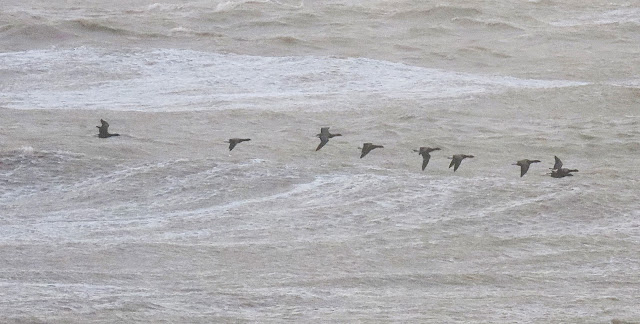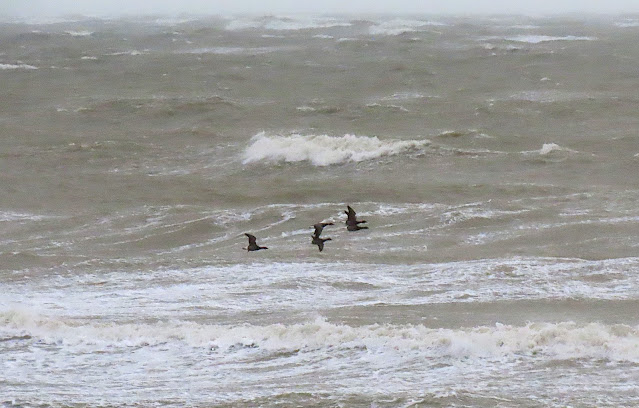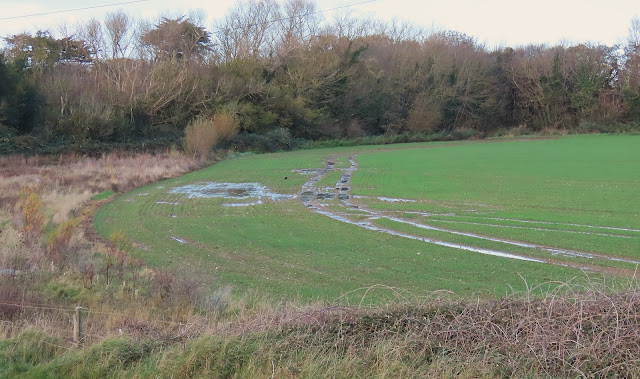Sunday, 24th November: Similar to yesterday with Storm Bert still making its presence felt; a dry, grey morning but very windy with a SSW gale and the prospect of rain later....
Elmer Rocks (0830-1100hrs): Again a sheltered look at the sea was the only sensible option, with the land being blasted by the wind. It was hard going, with rather little reward for my efforts, a total of 52 Brent Geese and three Kittiwakes going west being about the meagre best, whilst up to seven Red-breasted Mergansers were back and forth over the rough sea, plus a Great Crested Grebe. A flock of 18 Sanderlings dropped onto the beach to feed for a short while and the only other species of note were three Oystercatchers, several Turnstones and three Common Gulls.
Brent Geese passing westwards at Elmer Rocks; several smallish flocks moved through this morning, whilst (bottom) a flock of Sanderlings dropped in to feed
Saturday, 23rd November: A complete change to milder conditions again, but also becoming wild and windy with the effects of 'Storm Bert' passing through. Gale force SSW winds and heavy cloud throughout the day, though with a mainly dry morning, but heavy persistent rain by afternoon.
Elmer Rocks (0915-1115hrs): The only option was to find a sheltered spot and watch the sea, hoping for something unusual to pass in the storm. Sadly it didn't happen here - although other headlands such as Selsey did considerably better - but local conditions and a murky horizon meant that plenty was probably moving well beyond my viewing range. Those birds I did manage to see were as follows:-
Gannet - 3W
Great Crested Grebe - 1 o/s
Brent Goose - 72W
Shelduck - 2W
Red-breasted Merganser - 5W
Ringed Plover - 23
Turnstone - 10
Sanderling - 1
Rock Pipit - 1
Small flock of Brent Geese battling through stormy conditions at Elmer Rocks
Friday, 22nd November: A clear night giving way to a cold and frosty start and a mainly sunny day, but with a bite to the NW breeze force 4.
Elmer Rocks: It was slow going this morning, but a bit of a mixed bag, albeit nothing exciting was found. Offshore a Red-throated Diver went east and seven Brent Geese and four Mediterranean Gulls went west, whilst just a couple of Red-breasted Mergansers and Great Crested Grebes went back and forth over the sea. Along the beach at low tide were a number of the regular waders, albeit they were frequently disturbed by walkers, but a fairly casual count logged 15 Ringed Plovers, five Grey Plovers, 12 Sanderling and 15 Turnstones, plus three Little Egrets.
Most of the activity was actually in the fields just behind the beach, adjoining the set-aside area, around a small area of flood amongst the winter wheat, where at least 35 Pied Wagtails were feeding, together with a Grey Wagtail, at least three Meadow Pipits, a Rock Pipit and a couple of Skylarks. In the set-aside was a Snipe, whilst three Chiffchaffs were also present along the hedgerows.
Most of the action was here this morning, around the small flooded area in the crop field and adjacent to the set-aside area.
(above) Meadow Pipit, (below) Pied Wagtails, (lower) Rock Pipit and (bottom) Rock Pipit with Pied Wagtail
Bilsham farm: On the reservoir it was apparent that the cold weather had reduced numbers still further and Coots were now down to about 100. Wildfowl consisted of 16 Canada Geese, four Tufted Ducks, one Pochard and 16 Shoveler, whilst the Little Grebe count had actually increased to nine, A Grey Wagtail was around the edges and a single Chiffchaff was in the adjacent hedges.













No comments:
Post a Comment